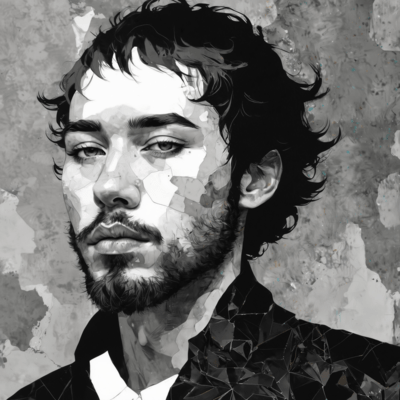

わしゃあ 高知の田舎で生まれて
最初はただの泣き虫の子やったがよ
武士の家に生まれたけんど
普通の道は歩めんかったき
剣術に目覚めて 江戸に出たときゃあ
目の前に広がる世界は 火薬みたいに爆ぜちょったがよ
黒船来たときゃあ 日本の現状にキレとったき
このままじゃあ 日本は終わるぜよって
脱藩したときゃあ 土佐は大騒ぎやったけんど
わしゃあ かまわんかった
勝海舟に会って 航海術や政治のこと いろいろ学んだき
薩長同盟作るときゃあ
みんなが無理やと言よったけんど わしゃあ諦めんかった
亀山社中作って 海援隊作って 日本を変える仕組みを作りまくったき
大政奉還実現させたときゃあ まさに人生の頂点やったがよ
33歳で暗殺されたけんど わしゃあ悔いは一切無いき
短い人生やったけんど 日本の歴史を大きく変えたと自負しちゅうがよ
土佐の血が わしゃあの背中を押しよったき
自由と変革を信じて 最後まで走りきったがよ
おまんらも 自分の信じる道を突き進め
それが 本当の生き方やき
世の人は我をなんとも言わば言え
我が成す事は我のみぞ知る
- Lyricist
MaverickTongue
- Composer
MaverickTongue
- Producer
MaverickTongue
- Ensemble
MaverickTongue

Listen to Yakiy starring.RyomaSakamoto by MaverickTongue
Streaming / Download
- ⚫︎
Yakiy starring.RyomaSakamoto
MaverickTongue
"Whatever people may say about me, I know what I'm doing."
This song expresses the life of Sakamoto Ryoma, known as a patriot of the late Edo period. Through this song, we hope that listeners will have the opportunity to encounter Sakamoto Ryoma's way of life and thoughts, and to deepen their reflections on their own lives and ideals. We also hope that, inspired by the spirit embodied in Ryoma's famous words, listeners will gain the courage to move forward with their own convictions.
Sakamoto Ryoma was born on November 15, 1835 (by the old calendar), in Tosa Domain (present-day Kochi Prefecture), as the youngest of six siblings in a low-ranking samurai family. From childhood, he devoted himself to swordsmanship, and at 19, he went to Edo to study, training at the dojo of the Hokushin Itto-ryu school.
Ryoma's life coincided with the Bakumatsu period, a time of great change for Japan. Triggered by the arrival of Commodore Perry's black ships, he initially embraced the ideology of revering the emperor and expelling foreigners. However, he later developed an ambition to modernize Japan by incorporating Western knowledge and technology.
His activities were diverse. He became a disciple of Katsu Kaishu, contributed to the establishment of the Kobe Naval Training Center, and studied navigation. He also founded a trading company called "Kameyama Shachu" in Nagasaki, mainly dealing in Western-style guns.
One of Ryoma's most significant achievements was his contribution to the formation of the Satsuma-Choshu Alliance, mediating between the opposing Satsuma and Choshu domains. This alliance became the driving force behind the subsequent Meiji Restoration. Furthermore, he compiled his vision for a new national system in the "Eight Proposals While Shipboard," which, when presented to the shogunate through the Tosa domain, led to the realization of the return of political power to the Emperor by Tokugawa Yoshinobu.
However, Ryoma's life was cut short. On November 15, 1867 (by the old calendar), his 33rd birthday (by Japanese count), he was assassinated in Kyoto. He closed his life just before the dawn of the Meiji Restoration.
Sakamoto Ryoma is known as a figure who greatly contributed to Japan's modernization with his free thinking and dynamic action, unbound by the feudal system. His perspective of "Japan in the world" and his attitude of pioneering a new era hold universal value that is still relevant today.
Sakamoto Ryoma's famous words, "Whatever people may say about me, I know what I'm doing," teach the importance of acting according to one's own convictions without being swayed by others' evaluations or criticisms. These words serve as an important guide for self-realization, personal growth, and social change.





